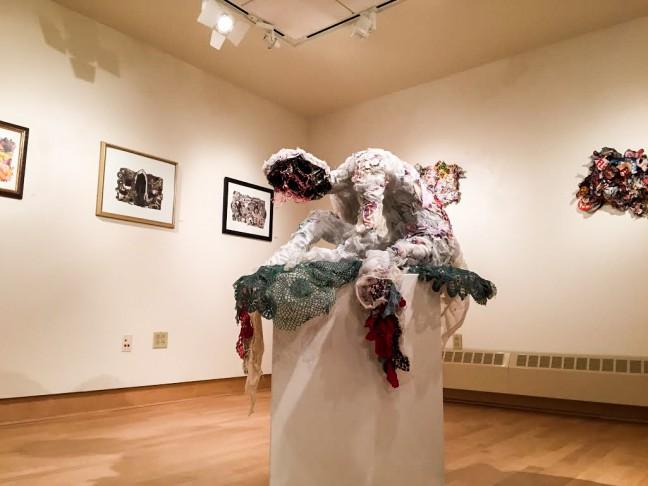When Nathan Fritz was too young to know the importance of what he was doing, he got his first lesson in gender roles. He was playing with Barbies in class and his teacher told him not to.
This small dose of conservative gender dichotomies would lead to a long and arduous path of gender confusion.
Fritz has manifested these feelings physically and artistically in his collection “Gender Pains.”
Tucked away on the second floor of Memorial Union, the new Class of 1925 Gallery contains a tangled road map through Fritz’s evolving and amorphous gender identity.
The road began in a small town where Fritz said he struggled with his own identity, but the struggle was muted. Because there was so little he could do without being ostracized, he said he ignored his inclinations.
Fritz describes the attitude of his town with the refrain, “It was simpler times, when men were men.”
In that vein, his “Gender Pains” collages depict his youth by harking back to the “simpler” times when the gender dichotomy was celebrated. He uses mostly old magazine images of women in the home or men at work to play to these gender roles.
“I was raised with a gender perception that I can see is more in line with what I see reflected in ’50s through ’80s media — pretty dated perceptions,” Fritz said. “So when I see those magazines, it’s sort of a comforting sentimental reaction. It’s comforting in that sort of conservative way, knowing where you ought to stand.”
Each collage plays to the traditional characteristics of men and women in ‘50s society. The men are black and white, chiseled and inaccessible. The women are polished and demure. When they interact in the same piece, they are disparate and untouching.
The collages are large and come out of the wall, looking like they could morph into another shape at any moment. They reflect the fickle nature of Fritz’s own ideas about what gender should be.
“It’s loud, busy and psychological,” WUD Art Committee Director Anais Reyes said in an email to The Badger Herald. “Each collage has so much to look at, you just get pulled in. At the same time, however, they are made with such complex intensity that they refuse to easily give up any real answers.”
The path begins to narrow as the exhibit moves from the collages on the wall to the soft sculptures in the middle of the floor.
Though they only add to the fettered ideas of gender, the sculptures delve more into the personal side of Fritz’s identity. When he went to college at Beloit, those previously stagnated questions of identity came to a head.
“Freshman year was one of the most volatile nature because it was all fresh,” Fritz said. “I was in a new context where things were much more open and I was being presented with much more images, other possibilities.”
Fritz identified as a woman for most of college, but never completely settled into one side of the binary. His work reflects that inability to remain dormant or comfortable in any role. His soft pieces seem like they could shape shift like the inner workings of Fritz’s brain.
Now as a teacher in the city of Chengdu in China, Fritz must conceal any element of his gender identity that doesn’t fit inside the boundaries of Chinese culture.
Because he wants to travel and work internationally, Fritz said he can’t express himself as anything other than a man for fear of violence and misunderstanding.
At this point, a year after he submitted his collection, he continues to feel these gender pains of having a dysphoric identity. But Fritz said he is beginning to feel more comfortable in being unsettled.
Expressing these feelings through art is not a cure-all for Fritz, but he said it helps.
“It is a relief to have [my artwork] out there, to give a lot of energy, all of feelings and ideas a discernible, real, physical shape,” Fritz said. “So I can easily quantify it and see it and look at it over there in real space, instead of some pent up confusing tangled mass in my head. In that way it is a relief; it gives a lot of shape to things I don’t quite understand.”
Fritz’s “Gender Pains” will be open through Dec. 1.


